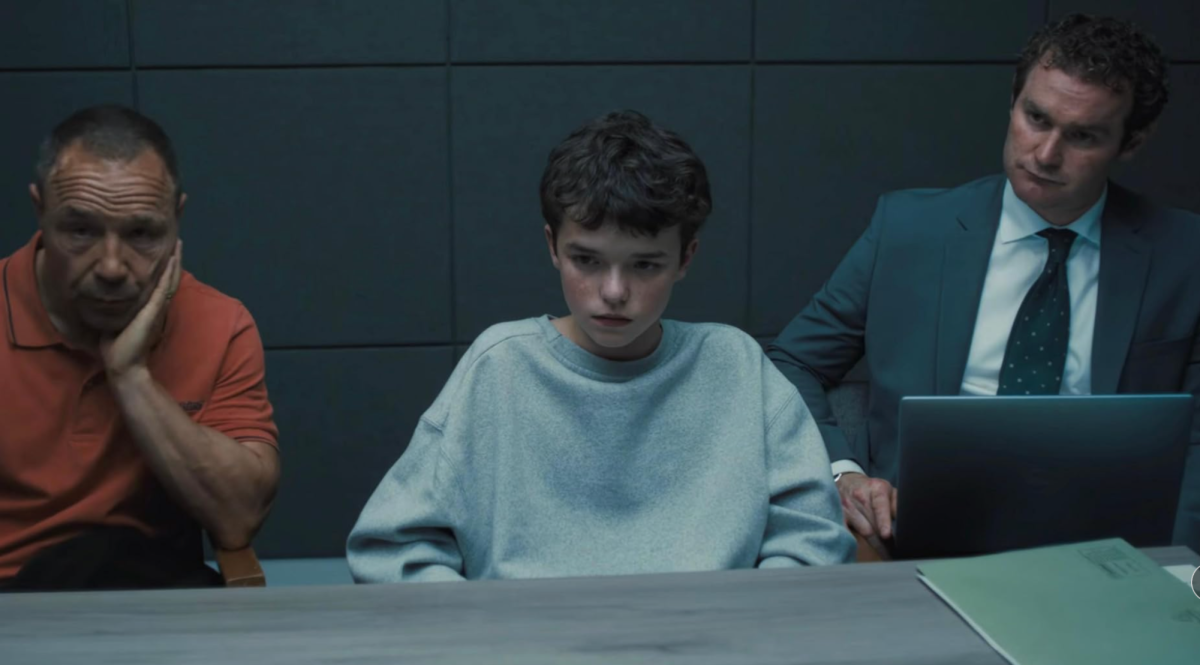
“Adolescence” hits you like a freight train. The four-episode miniseries effectively explores how today’s society fails to understand its youngest members and the devastating consequences of this failure.
Created by Jack Thorne and Stephen Graham, “Adolescence” follows 13-year-old Jamie Miller (Owen Cooper), who murdered his classmate, Katie Leonard (Emilia Holliday). The series focuses on four specific moments revolving around Jamie and his family throughout the 13 months of the ensuing criminal case: Jamie’s arrest, the police’s investigation at Jamie’s school, Jamie’s psychological assessment and Eddie Miller’s (Stephen Graham), Jamie’s father, birthday.
One of the most unique aspects of “Adolescence” is its use of one-shots. A personal favorite film and television technique of mine, one-shots — especially when implemented properly — allow the audience to truly immerse themselves in the scene. “Adolescence” takes this approach to the extreme, filming each episode as a continuous shot from beginning to end, without a single cut breaking the camera’s movement.
At its best, this stylistic choice effectively captures the emotional state of the setting and its characters. In particular, the chaos of the first episode, which focuses on Jamie’s arrest and initial questioning, exemplifies precisely the strength of this approach. The scene’s chaos comes alive in the brisk movements, panicked voices and constant action that the camera captures completely. The camera’s slow, steady observation as it follows the police invasion of the Millers’ home to Jamie’s subsequent detainment makes the viewer feel like an inside observer. This deliberate pacing allows the details to truly sink in bit by bit and the audience to forge a connection to the scene at hand.
However, there are also moments where the one-shot becomes more disruptive than immersive. This is most apparent in the second episode, which focuses on the police’s investigation in Jamie’s school. There are moments where you are just watching the officers and teachers walking and staring seriously at the kids and their surroundings, which feels like wasted time rather than a meaningful immersion. One can only take so much empty movement, especially when it starts to feel like an unnecessary waiting period before the next piece of dialogue.
Already a strong script, phenomenal performances from the cast elevate the strengths of the writing. Among this strong ensemble, Cooper is a completely wonderful surprise.
This series is Cooper’s acting debut, yet he seems to embody his complex character’s nature with such ease. Jamie holds a deep, poisonous anger that appears in devastating waves, distorting his youthful face into something horrible. Underneath this shocking anger is a deep insecurity that reveals a heartbreaking desperation for love. Cooper seamlessly blends these contradicting aspects of Jamie to form a character whose insecurities and anger have grown out of control.
Cooper particularly shines in the series’ third episode, which centers around one of Jamie’s evaluation sessions alongside psychologist Briony Ariston (Erin Doherty). Doherty appears only in this episode and truly makes the most of her screen time. Briony hides her true feelings under a mask that she pierces from time to time with small glimpses into the internal turmoil slowly building within during her conversation with Jamie. The pair play off one another in a manner that brings a tense, compelling energy to the episode as Briony attempts to understand who Jamie is.
As much as “Adolescence” is about Jamie, a crucial part of the series is Jamie’s parents, Eddie and Manda (Christine Tremarco). Their perspectives and pain take center stage in the fourth episode, revealing the grief, disbelief and fragility that they carry. Graham’s and Tremarco’s performances are just devastating, pain weighing on their every word and action. Their final conversation in the last episode is especially heartbreaking as they confess to one another the hard blame they put on themselves for Jamie’s crime. Together, they slowly come to terms with the fact that they can regret the past but they must also accept what’s happened and realize — despite their failures — they tried their best to be good parents.
“Adolescence” is heavy. It’s a difficult show to watch and process, but it’s a show that is important to see. It brings an awareness to the importance of making that effort to understand the often confusing worlds in which teenagers operate. Parenting is always going to be a black box — an experience that nobody truly understands until they are living it — but taking that step to understand a child’s world and the emotions they are just learning to describe can do more good than one can ever imagine.




















